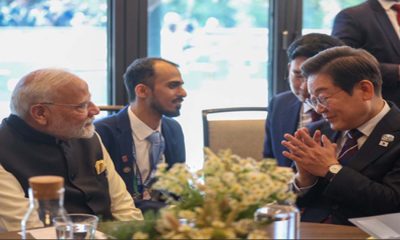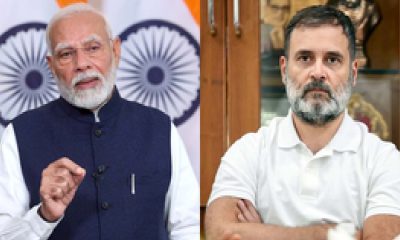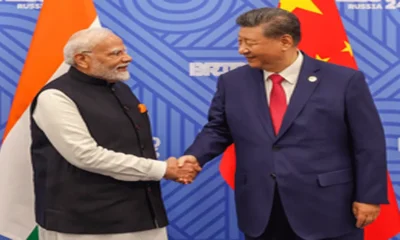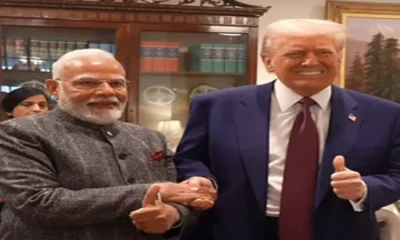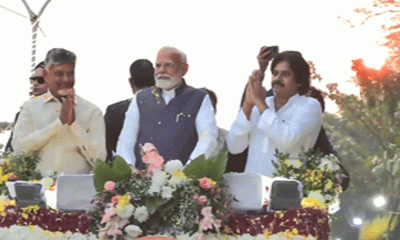Tech
PM Modi set to gift 5G services to Indians on Oct 1

The National Broadband Mission (NBM) under the Ministry of Communications on Saturday tweeted (and later deleted) that Prime Minister Narendra Modi will officially roll out the 5G services in India on October 1 — the same day when the India Mobile Congress (IMC) kicks off which will heavily focus on 5G and related domains.
All the top telecom honchos — including Reliance Industries Chairman and Managing Director Mukesh Ambani and Founder and Chairman of Bharti Enterprises Sunil Bharti Mittal — are scheduled to join the keynote address at the sixth edition of the IMC that will take place at Pragati Maidan, New Delhi, from October 1-4.
“Taking India’s digital transformation & connectivity to new heights, Hon’ble PM, @narendramodi, will roll out 5G services in India; at India Mobile Congress; Asia’s largest technology exhibition,” read the screenshot of the tweet (now deleted from the NBM handle).
The event will see participation from telecom gear manufacturers and other industry stakeholders, in the presence of IT Minister Ashwini Vaishnaw.
According to sources, the government may showcase some successful 5G testbeds being run in the country by Reliance Jio, Airtel and Vodafone Idea at the IMC 2022, jointly organised by the Department of Telecommunications (DoT) and the Cellular Operators Association of India (COAI).
During his Independence Day address from the ramparts of the Red Fort, the Prime Minister had said that the 5G services will be launched in India soon.
Vaishnaw last month said the government expects 5G services to be rolled out in the country by October 12, and the Centre will make sure that the prices are affordable for the consumers.
Vaishnaw said that installations are being done and telecom operations are busy with the seamless rollout of 5G services.
The government will ensure that the 5G plans remain affordable for the public, the minister said.
The 5G services would be rolled out in a phased manner and during the first phase, 13 cities are likely to get the 5G internet services.
The cities are Ahmedabad, Bengaluru, Chandigarh, Chennai, Delhi, Gandhinagar, Gurugram, Hyderabad, Jamnagar, Kolkata, Lucknow, Mumbai and Pune.
Just like 3G and 4G, telcos will soon announce dedicated 5G tariff plans and according to industry experts, consumers may pay more to access the 5G services on their devices.
An immediate tariff war with the launch of 5G is unlikely, but it “will be competitive as India continues to be a price-conscious market”.
Business
India, Japan can diversify trade basket, open new frontiers with renewed efforts: PM Modi

Tokyo, Aug 29: Hailing the robust India-Japan economic and trade partnership, Prime Minister Narendra Modi on Friday said with renewed efforts, both nations can diversify their trade basket, make it more balanced, and open up new frontiers as well.
In an interview with Japanese newspaper The Yomiuri Shimbun, the Prime Minister said we must aim bigger and remain ambitious.
“The synergies across governments, businesses and people can create scale and speed in our economic partnership. As the world’s leading economies, we have been contributing to each other’s growth, competitiveness and dynamism,” PM Modi told the publication.
Japan has been a trusted partner in India’s infrastructure development across generations. The country has also been a leading source of foreign direct investment (FDI) for India in key sectors, including automobiles, electronics, telecom, chemicals, finance, and pharmaceuticals.
According to PM Modi, the number of Japanese firms in India has grown steadily to around 1,500, while more than 400 Indian companies operate in Japan.
“Clearly, this is only the beginning — the real potential is much higher,” he noted.
“We maintain important trade relations, but it has not yet reached the levels envisaged under our CEPA (Comprehensive Economic Partnership Agreement)… The 20th century saw Japan emerge as a major partner in India’s infrastructure development. I am confident that the 21st century will see Japan as a major partner in India’s innovation, manufacturing, and global value chains,” the Prime Minister emphasised.
On semiconductors, PM Modi told the publication that India’s semiconductor sector is on the cusp of transformation.
“We have put in place a comprehensive regulatory and policy framework, backed by incentives, to build a strong semiconductor and display ecosystem. Already, six semiconductor units are taking root in India, with four more on the way. By the end of this very year, ‘Made in India’ chips will be in the market, a clear demonstration of India’s design and manufacturing capabilities,” the Prime Minister said.
Japanese companies, with their technological strengths and global leadership, can play a pivotal role in this journey, he said, adding that a strong beginning has already been made.
“By combining India’s scale and capabilities with Japan’s advanced technologies, we can build a resilient and trusted semiconductor value chain,” PM Modi stressed, adding that this collaboration will support the technological ambitions of both our countries and enhance global supply chain security.
“I see semiconductor cooperation emerging as a major pillar of the India–Japan partnership. After all, in this digital century, chips are not just about computers, they are about competitiveness, credibility and confidence in the future,” he mentioned.
Some Japanese companies are positioning their production bases in India as hubs for third-country markets such as Africa.
According to PM Modi, India has seen multi-faceted reforms which make manufacturing in India easier than ever before.
“We have removed compliance burdens, rolled out incentives and ensured a large skilled workforce for companies to set base in India. Many global companies, including those from Japan, are setting up their production in India not only to cater to our domestic market, but also for the world,” he highlighted in his response.
Japanese automaker Suzuki Motor Corporation this week announced it will invest Rs 70,000 crore in India over the next five to six years. The investment will be used to increase production, introduce new car models, and protect its leadership position in the world’s third-largest automobile market.
“Just a couple of days back, I was at the Suzuki plant in India where we flagged off electric vehicles to be exported to a hundred countries, including Japan,” said PM Modi.
Business
Indian equity indices decline sharply over US tariff concerns
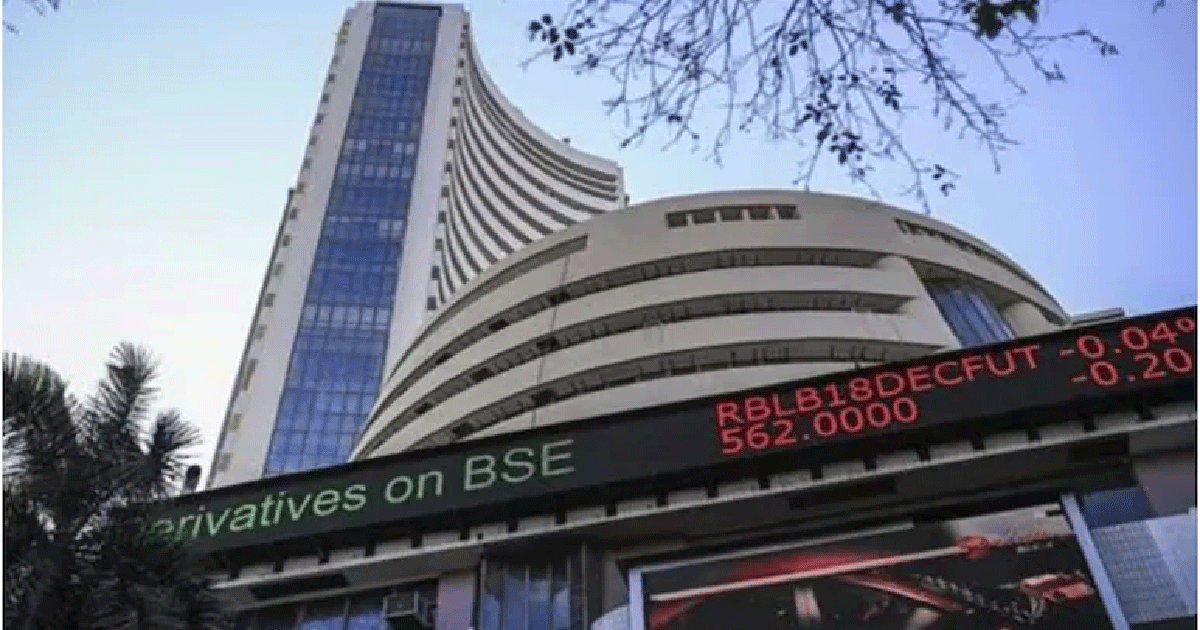
Mumbai, Aug 28 : The Indian equity indices fell sharply to end the session nearly one per cent lower on Thursday — a day after the 50 per cent US tariffs on Indian goods came into effect.
Sensex ended the session at 80,080.57, down 705 points or 0.87 per cent. The 30-share index started the session in negative territory at 80,754 against last session’s closing of 80,786.54 amid selling across the sectors. The Index further extended the losing momentum to hit an intra-day low at 80,013.02 following the implementation of US tariffs on Indian goods.
Nifty settled at 24,500.90, down 211.15 points or 0.85 per cent.
“Domestic equities ended lower as pessimism took hold following the implementation of tariffs on Indian goods, dampening investor sentiments. While the cotton import duty exemption briefly lifted hopes of policy support to counter tariff impacts, triggering a short-lived intraday recovery, investor mood remained fragile, with large caps declining and mid and small caps underperforming amid risk-off sentiment,” said Vinod Nair, Head of Research, Geojit Investments Limited.
Most sectors, including Auto, IT, FMCG, and Metals, traded in the red as investors turned to profit-booking from recent gains, while consumer durables outperformed, likely supported by GST rationalisation and expectations of festive demand, Nair added.
HCL Tech, TCS, Power Grid, Infosys, Hindustan Unilever, HDFC Bank, ICICI Bank, Bharati Airtel, Mahindra and Mahindra, Trent, Tata Motors, Sun Pharma, NTPC, BEL, Eternal and SBI were the top losers from the Sensex pack. While Titan, L&T, Maruti Suzuki, and Axis Bank were top gainers.
The majority of sectoral indices settled in negative territory amid selling pressure. Nifty Fin Services dropped 312.30 points or 1.20 per cent, Nifty Bank fell 630.10 points or 1.16 per cent, Nifty Auto declined 136.80 points or 0.54 per cent, Nifty FMCG closed 574.05 points or 1.02 per cent, and Nifty IT slipped 574.45 points or 1.59 per cent.
Broader indices followed suit as well. Nifty Small Cap 100 dipped 254.25 points or 1.45 per cent, Nifty Midcap 100 fell 718.70 per cent or 1.45 per cent, and Nifty 100 closed 235 points or 0.93 per cent lower.
Rupee traded weakly as selling pressure in capital markets deepened, with FII flows continuing to remain negative amid persistent concerns on India’s growth outlook and fiscal deficit.
“The imposition of a 50 per cent US tariff has raised uncertainty over exports, weighing on overall sentiment, until there is clarity on alternatives either through negotiations with the US or by striking trade agreements with other nations — investors are likely to stay cautious,” said Jateen Trivedi of LKP Securities.
The rupee is expected to remain under pressure with a near-term range of 87.25–88.25, he added.
Maharashtra
Tesla To Open First Charging Station In Mumbai Next Week: All Details
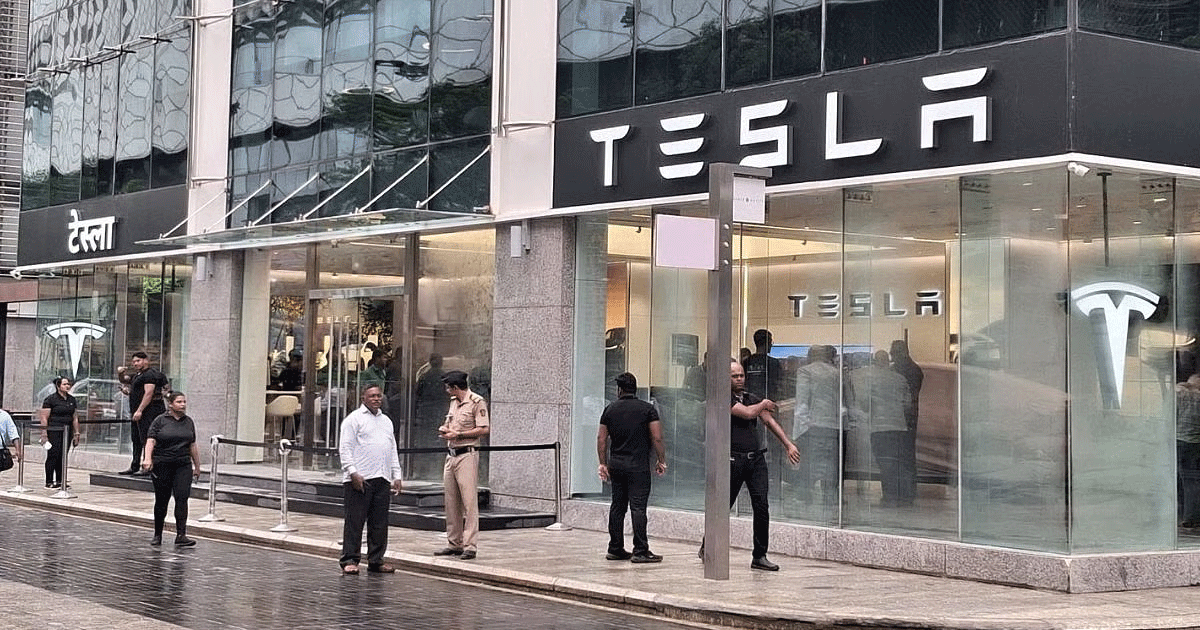
US-based electric car maker Tesla will open its first charging station in India next week in Mumbai, the company announced on Friday.
The station will have four V4 Supercharging stalls for DC charging and four destination charging stalls for AC charging.
The Superchargers will offer a peak charging speed of 250 kW, priced at Rs 24 per kWh, while the destination chargers will provide 11 kW at Rs 14 per kWh.
“This will be the first of the eight Supercharging sites that were announced during the launch in Mumbai, with more planned across the country, to provide the optimal cross-country experience,” the company added.
Tesla said this will be the first of eight Supercharging sites announced during its Mumbai launch last month, with more planned across the country to make cross-country travel convenient for Tesla owners.
The company had entered the Indian market in July with the launch of its Model Y, priced from Rs 59.89 lakh, along with its first experience centre at Maker Maxity Commercial Complex in Bandra Kurla Complex in Mumbai.
The BKC facility offers both fast-charging and regular options, catering to the needs of different EV users.
According to Tesla, the Model Y can gain up to 267 kilometres of range in just 15 minutes using its Superchargers — enough for five round trips between Mumbai’s Chhatrapati Shivaji Maharaj International Airport and the Gateway of India.
“Model Y can add up to 267 kilometres of range in just 15 minutes with Tesla Superchargers, enough for 5 return trips between Chhatrapati Shivaji Maharaj International Airport, Mumbai and Gateway of India,” the US-based carmaker said.
As part of its customer offer, Tesla will also provide a free wall connector with every new car purchase, which will be installed at the buyer’s residence.
-

 Crime3 years ago
Crime3 years agoClass 10 student jumps to death in Jaipur
-

 Maharashtra1 year ago
Maharashtra1 year agoMumbai Local Train Update: Central Railway’s New Timetable Comes Into Effect; Check Full List Of Revised Timings & Stations
-

 Maharashtra12 months ago
Maharashtra12 months agoMumbai To Go Toll-Free Tonight! Maharashtra Govt Announces Complete Toll Waiver For Light Motor Vehicles At All 5 Entry Points Of City
-

 Maharashtra1 year ago
Maharashtra1 year agoFalse photo of Imtiaz Jaleel’s rally, exposing the fooling conspiracy
-

 National News12 months ago
National News12 months agoMinistry of Railways rolls out Special Drive 4.0 with focus on digitisation, cleanliness, inclusiveness and grievance redressal
-

 Maharashtra11 months ago
Maharashtra11 months agoMaharashtra Elections 2024: Mumbai Metro & BEST Services Extended Till Midnight On Voting Day
-

 National News1 year ago
National News1 year agoJ&K: 4 Jawans Killed, 28 Injured After Bus Carrying BSF Personnel For Poll Duty Falls Into Gorge In Budgam; Terrifying Visuals Surface
-

 Crime12 months ago
Crime12 months agoBaba Siddique Murder: Mumbai Police Unable To Get Lawrence Bishnoi Custody Due To Home Ministry Order, Says Report



